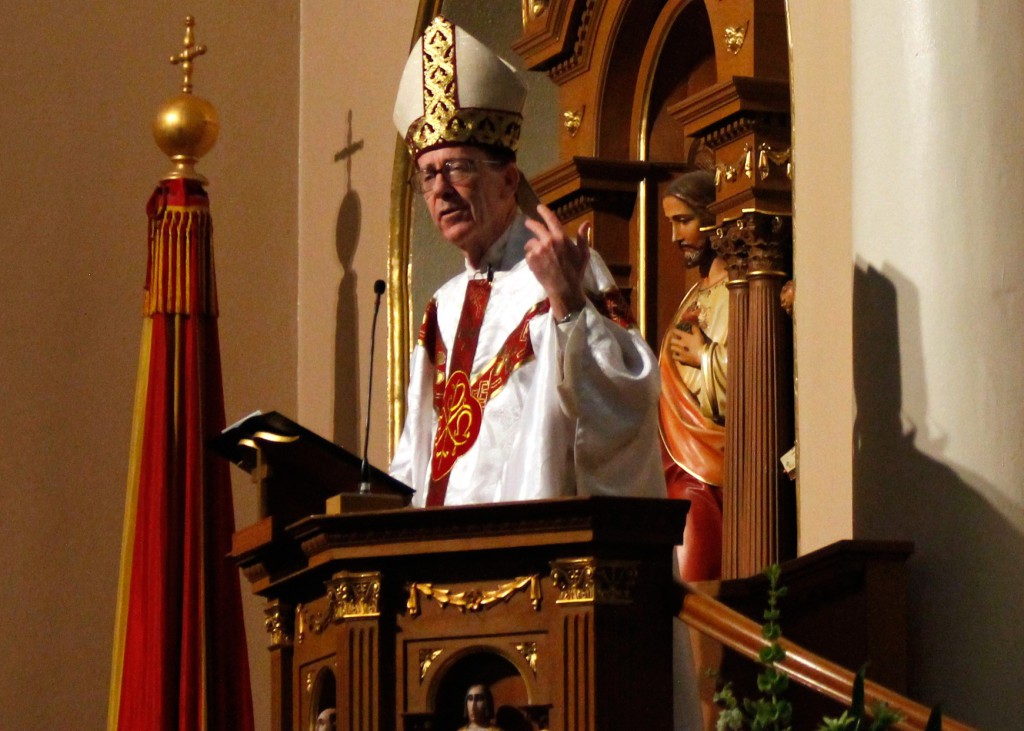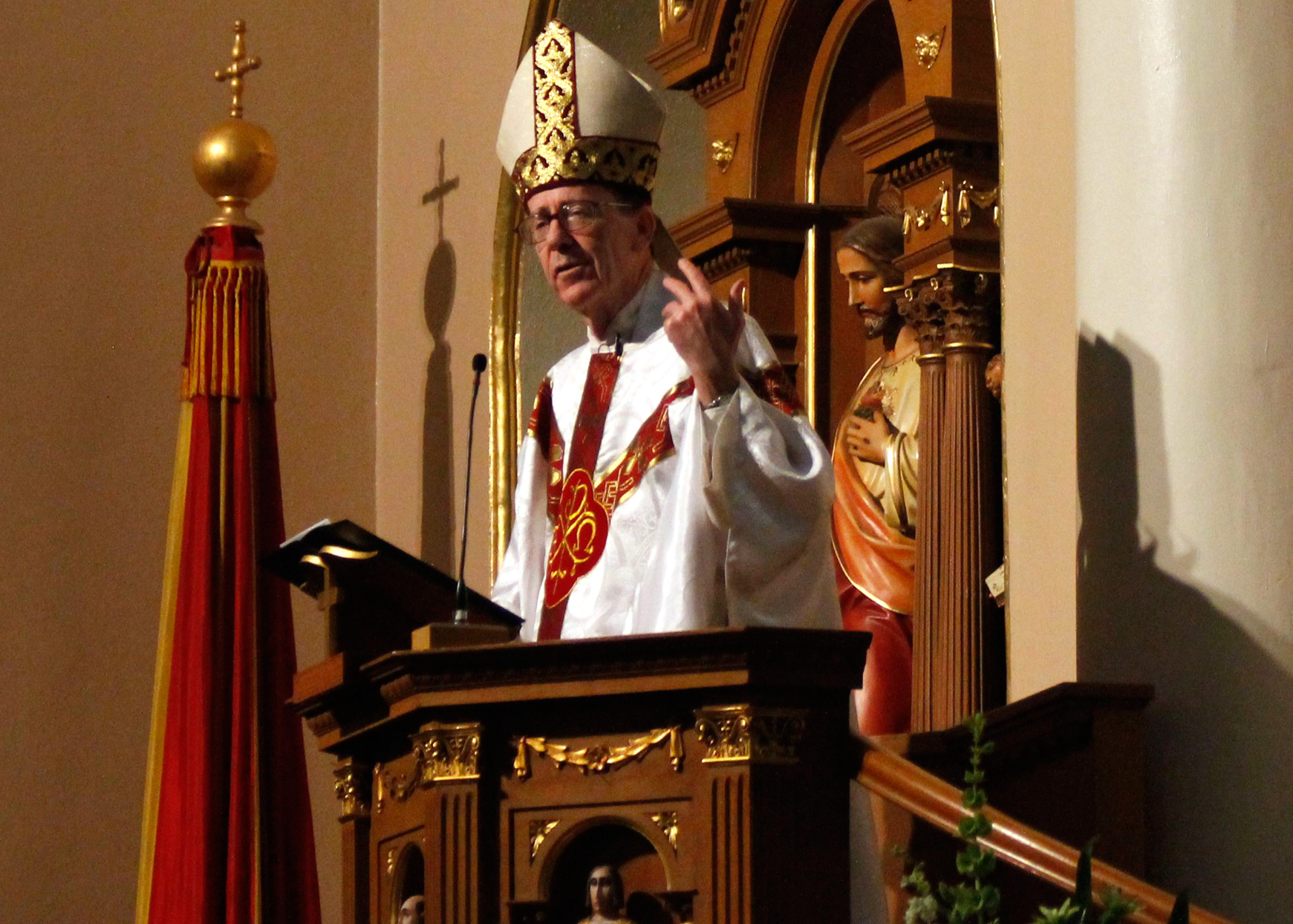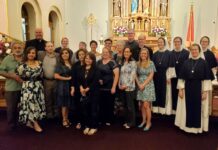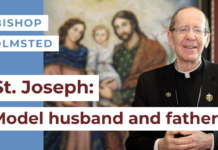
Following are Bishop Thomas J. Olmsted’s homily notes for the Mass celebrating the first feast day of St. John Paul II. It was celebrated Oct. 22, 2014, at St. Mary’s Basilica in Phoenix.
On the 50th anniversary of his ordination as a priest, St. John Paul II published a memoir which offered a personal glimpse into his priestly heart. He focused on two words, two realities that were the most prominent in his life: mystery and gift — the mystery of Christ and the gift of believing in Him.
Looking back over 76 years, Karol Wojtyla might have chosen to see only pain and suffering, for he had known more than his share of those. Instead, he saw gift and mystery.
Something similar happened to an American contemporary of Karol Wojtyla by the name of Dorothy Day. Like the future Polish pope, she loved writers and poets, including the Russian novelist Fyodor Dostoevsky. Looking back on her tumultuous life, she found great meaning and even consolation in Dostoevsky’s words: “Love in reality is a harsh and dreadful thing compared to love in dreams.”
The gift of love reaches us in the mystery of suffering with Christ. This truth came home to Dorothy when she least expected it, when, after having aborted her first child, and while living with a man who did not believe in marriage, she gave birth to a little girl. Within weeks of her baby’s birth, Dorothy knew beyond a doubt that the best thing she could do for her child was the gift of Baptism. And in order to baptize her child she herself needed to be baptized; and for that to happen, she had to make costly changes in her life. But, with new-found faith, she could see that it is the harsh and dreadful love of Jesus on the Cross that brought light and joy to the darkness of her heart.
When Jesus’ disciples on the way to Emmaus looked back on the previous days’ events in Jerusalem, they saw only defeat and shame in the Passion and death of their Master. When asked by the companion who had joined them along the way, “What kind of things happened there?” they said, “Are you the only visitor to Jerusalem who does not know what has taken place there?” Jesus, then, helped them to see gift and mystery where previously they saw defeat and shame. This is what Jesus taught Karol Wojtyla, the future John Paul II, to do.He came to believe in Jesus words, “It was not you who chose me, but I who chose you and appointed you to go and bear fruit that will remain” (Jn 15:16).
Already as a little child, Karol Wojtyla discovered a love that was embodied in the tenderness of his mother and the protective care of his father, but that reached far beyond his Polish home in Wadowice, a love that would carry him, one day, to nearly every country in the world as an Apostle of Jesus Christ, a servant of the servants of God.
But, as is the case for many, his vocation in life was not something he perceived during his teenage years. At that time, he had a passion for the theater, and a keen interest in the study of languages. A call to the priesthood never seriously entered his mind until his academic career came to a sudden stop with the outbreak of the Second World War and the German occupation of his homeland. When the university he was attending was closed down, he became engaged in an underground theater, a dangerous enterprise during the brutal martial law imposed by the Nazi regime. But, as he braved the dangers of performing in the “Theatre of the Living Word,” the word of God came alive for him in a new way; he heard the Lord calling him to become a priest. It was the mystery of evil that helped the future pope to discover the far greater mystery of God’s love.
This was a lesson he never forgot, one that was repeated on many occasions throughout his life: the love of God breaks through in the most unexpected ways, precisely when evil seems to triumph or sorrow breaks our heart.
St. Paul writes about this gift and mystery in his many Letters of the New Testament. Today, through his letter to the Ephesians, he says, “To me, the very least of all the holy ones, this grace has been given, to preach to the Gentiles the inscrutable riches of Christ, and to bring to light for all what is the plan of the mystery…accomplished in Christ Jesus our Lord.”
No one expected Saul of Tarsus to become a follower and then an apostle of Jesus—least of all Saul himself. But the gift of faith in Christ is indeed a mystery. The Lord chooses the weak to confound the strong, the foolish to humble the wise. And, as St. Paul insisted, the Lord chooses the worst of sinners to show the power of His mercy for all.
In the Gospel, today, Jesus tells us to be prepared for God to work in unexpected ways in the world. He says, “You, too, must be prepared, for…the Son of Man will come…at an hour you do not expect.”
No one expected Cardinal Karol Wojtyla to be elected pope in October 1978. All the pundits and talking heads overlooked this man from behind the Iron Curtain. His name was not among the “papabile” suggested by experts outside or inside the Church. But God’s ways are not our ways; they are far better and far more wrapped in the mystery of love.Pope Saint John Paul II liked to say, “There is no such thing as coincidence.” We may not understand why the Lord does what He does but we can be sure that all things unfold under his providential love.
Jesus tells us today, “Much will be required of the person entrusted with much, and still more will be demanded of the person entrusted with more.” We praise God that He entrusted so much to Karol Wojtyla, and that he responded with such heroic love to the gift and mystery.





![[VIDEO] Make Sunday feel like Sunday again](https://www.catholicsun.org/wp-content/uploads/2021/04/2021-YOUTUBE-BISHOP-MESSAGE-THUMBNAIL-ENGLISH-218x150.png)

